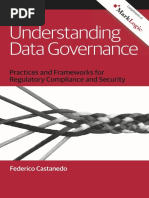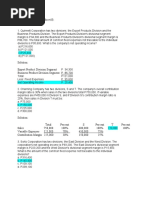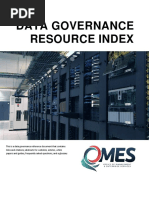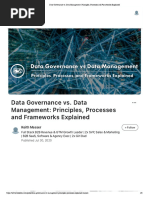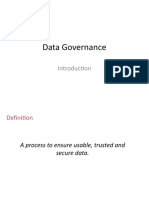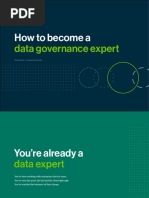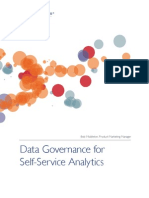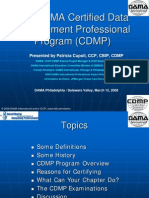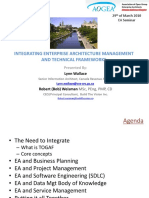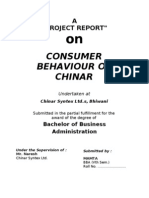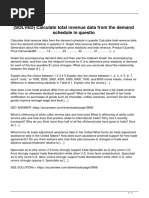DMBOK
DMBOK
Uploaded by
octoniCopyright:
Available Formats
DMBOK
DMBOK
Uploaded by
octoniCopyright
Available Formats
Share this document
Did you find this document useful?
Is this content inappropriate?
Copyright:
Available Formats
DMBOK
DMBOK
Uploaded by
octoniCopyright:
Available Formats
International Foundation
DAMA-DMBOK GuideTM (Data Management Body of Knowledge) An Introduction
Presented by Patricia Cupoli, CCP, CDMP, CBIP DAMA Philadelphia/Delaware Valley, March 12, 2008 Adapted from Mark Mosleys Presentation (DMBOK Editor)
DAMA International 2008 -- All Rights Reserved 1
International Foundation
Agenda
Our Maturing Profession What is the DAMA-DMBOK Guide? What are the Activities Within Each Data Management Function? Whats Been Done So Far? Whats Still to Come?
DAMA International 2008 -- All Rights Reserved
International Foundation
Our Maturing Profession
Data and information are increasingly recognized as enterprise assets. Data management is the development, execution and supervision of plans, policies, programs and practices that control, protect, deliver and enhance the value of data and information assets. Data management is an important function for enterprises in the Information Age. Data management is a shared responsibility between business data stewards and data management professionals. Data management is a new and maturing profession and DAMA is leading the way!
DAMA International 2008 -- All Rights Reserved 3
International Foundation
Hallmarks of a Maturing Profession
A professional community Continuing professional education Professional certification Higher education curriculum A recognized Body of Knowledge Standard terms and definitions Standard processes, roles and deliverables Guiding principles Best practices
DAMA International 2008 -- All Rights Reserved 4
International Foundation
What Is a Body of Knowledge?
The collective experience of the profession What is generally recognized as true Large and constantly growing Evolving Acceptance, Improvement, Innovation Summarized by a Guide to the BOK Primer and Starting Point
DAMA International 2008 -- All Rights Reserved 5
International Foundation
What Is the DAMA-DMBOK Guide?
The DAMA Guide to the Data Management Body of Knowledge (DAMA-DMBOK GuideTM) A book to be published by DAMA International A project sponsored by The DAMA Foundation Written and edited by DAMA members An integrated view A definitive introduction Modeled after other BOK documents:
PMBOK (Project Management Body of Knowledge) SWEBOK (Software Engineering Body of Knowledge) BABOK (Business Analysis Body of Knowledge) CITBOK (Canadian IT Body of Knowledge)
DAMA International 2008 -- All Rights Reserved
International Foundation
DAMA-DMBOK Guide Goals
To develop, build consensus and foster adoption for a generally accepted view of data management. To provide standard definitions for data management functions, roles, deliverables and other common terminology. To identify guiding principles. To introduce widely adopted practices, methods and techniques, without references to products and vendors. To identify common organizational and cultural issues. To guide readers to additional resources.
DAMA International 2008 -- All Rights Reserved
International Foundation
DAMA-DMBOK Guide Audiences
Data management professionals IT professional colleagues Data stewards Managers and executives Knowledge workers Consultants Educators Researchers
DAMA International 2008 -- All Rights Reserved
International Foundation
DAMA-DMBOK Guide Uses
Inform a diverse audience about data management Build consensus across the data management community Help all participants understand their responsibilities Point readers to additional sources of knowledge Help data management professionals prepare for Certified Data Management Professional (CDMP) exams Assist organizations in their enterprise data strategy Basis for effectiveness & maturity assessments Guide implementation & process improvement efforts Guide development of higher education curriculum Suggest academic research topics
DAMA International 2008 -- All Rights Reserved
International Foundation
Data Management Functions
Meta Data Management Document, Record & Content Management
Data Architecture, Analysis & Design
Database Management Data Governance
Data Warehousing & Business Intelligence Management Reference & Master Data Management
Data Security Management
Data Quality Management
DAMA International 2008 -- All Rights Reserved
10
International Foundation
Function Scope Summary
DAMA International 2008 -- All Rights Reserved
11
International Foundation
The DAMA-DMBOK Functional Framework Environmental Elements
Organization & Culture
Data Management Functions
Meta Data Management Document, Record & Content Management Data Architecture, Analysis & Design Database Management Data Governance Data Warehousing & Business Intelligence Management Reference & Master Data Management Data Security Management
Technology
Activities
Goals & Principles Practices & Techniques Roles & Responsibilities Deliverables
Data Quality Management
DAMA International 2008 -- All Rights Reserved
12
International Foundation
Environment Scope Summary
DAMA International 2008 -- All Rights Reserved
13
International Foundation
The DAMA-DMBOK Functional Framework
DAMA International 2008 -- All Rights Reserved
14
International Foundation
The DAMA-DMBOK Functional Framework
Framework Paper Written as Proposal to DAMA Available on DAMA Website Since July 2006 Over 2000 Downloads Worldwide To Date To 58 Countries!
USA Unknown Canada Australia UK India South Africa Brazil 48% 18% 7% 6% 3% 3% 3% 1%
Averaging 30 Downloads per Week Version 2.1 Now Posted
DAMA International 2008 -- All Rights Reserved 15
International Foundation
DAMA-DMBOK Guide Chapters
Chapter 1: Introduction Chapter 2: Data Management Overview
Activities, Deliverables, Roles, Technology
Chapters 3 11: DM Functions Chapter 12: Professional Development Consolidated Bibliography Recurring Themes
Stewardship Leadership Quality Integration Enterprise Perspective
DAMA International 2008 -- All Rights Reserved 16
International Foundation
Standard Chapter Format (3-11)
Introduction Defining Key Terms Goals Context Diagram Concepts & Activities Key Concepts and Guiding Principles Roles Performing Activities to Create Deliverables Using Best Practices & Common Techniques Using Technology Summary Guiding Principles Recap Process Summary Activities, Deliverables, Roles Org & Cultural Issues Recommended Reading
DAMA International 2008 -- All Rights Reserved 17
International Foundation
Sample Context Diagram
DAMA International 2008 -- All Rights Reserved
18
International Foundation
Dictionary of Data Management
Vital Need for a DMBOK Glossary The Semantics of our own Profession Large Enough to Publish Separately 900 Terms 100 Pages As DAMA Dictionary of Data Management Version 1.0
DAMA International 2008 -- All Rights Reserved
19
International Foundation
The DAMA-DMBOK Functional Framework
9 Data Management Functions Decomposed into many Activities Planning Activities (P) Control Activities (C) Development Activities (D) Operational Activities (O) Activities result in Deliverables Activities performed by Roles
DAMA International 2008 -- All Rights Reserved
20
International Foundation
DAMA-DMBOK Activity Outline
1. Data Governance 1. Data Management Planning
1. 2. 3. 4. 5. 6. 7. 8. 9.
2.
Identify Strategic Enterprise Data Needs (P) Develop and Maintain the Data Strategy (P) Establish the Data Management Professional Organizations (P) Identify and Appoint Data Stewards (P) Establish Data Governance & Stewardship Organizations (P) Develop, Review and Approve Data Policies, Standards and Procedures (P) Review and Approve Data Architecture (P) Plan and Sponsor Data Management Projects and Services (P) Estimate Data Asset Value and Associated Costs (P)
Data Management Supervision and Control
Supervise the Data Management Professional Staff and Organizations (C) Coordinate Data Governance Activities (C) Manage and Resolve Data Related Issues (C) Monitor and Ensure Regulatory Compliance (C) Communicate, Monitor and Enforce Conformance with Data Policies, Standards, Procedures and Architecture (C) 6. Oversee Data Management Projects and Services (C) 7. Communicate and Promote the Value of Data Assets (C) 1. 2. 3. 4. 5.
DAMA International 2008 -- All Rights Reserved
21
International Foundation
DAMA-DMBOK Activity Outline
2. Data Architecture, Analysis and Design 1. Enterprise Data Architecture
1. 2. 3. 4. 5. 6. 7. Develop the Enterprise Data Model (P) Align with Other Business Models (P) Define the Database Architecture (P) (same as 3.3.2) Define the Data Integration / MDM Architecture (P) (same as 6.2) Define the Data Warehouse / BI Architecture (P) (same as 7.2) Define the Metadata Architecture (P) (same as 9.2) Define Enterprise Taxonomies and Namespaces (P)
2. Data Modeling and Specification
1. Define Information Needs (D) 2. Develop and Maintain Logical Data Models (D) 3. Develop and Maintain Physical Data Models (D)
3. Data Model Quality Management
1. Develop Data Modeling Standards (P) 2. Review Data Model Quality (C) 3. Manage Data Model Versioning and Integration (C)
DAMA International 2008 -- All Rights Reserved
22
International Foundation
DAMA-DMBOK Activity Outline
3. Database Management 1. Database Development
1. 2. 3. 4. 5. 6. 7. 8. 9. 1. 2. 3. 4. 5. 6. 7. 8. 9. 1. 2. 3. 4. 5. 6. 7. Define Database Design Standards (P) Design Physical Databases (D) Review Database Design Quality (C) Develop Data Access Services (D) Develop Information Products ((D) Implement Development / Test Database Changes (C) Create and Maintain Test Data (D) Migrate and Convert Data (D) Test and Validate Data Requirements (D) Implement Production Database Changes (C) Obtain Externally Sourced Data (O) Plan for Data Recovery (P) Backup and Recover Data (O) Set Database Performance Service Levels (P) Monitor & Tune Database Performance (O) Plan for Data Retention (P) Archive, Retrieve and Purge Data (O) Manage Specialized Databases (O) Understand Data Technology Requirements (P) Define the Database Architecture (P) (same as 2.1.3) Implement and Maintain Database Environments (C) Evaluate Data Technology (P) Install and Administer Data Technology (O) Inventory & Track Data Technology Licenses (C) Support Data Technology Usage & Issues (O)
2. Database Production Support
3. Data Technology Management
DAMA International 2008 -- All Rights Reserved
23
International Foundation
DAMA-DMBOK Activity Outline
4. Data Security Management 1. Understand Data Privacy, Confidentiality and Security Needs (P) 2. Define Data Privacy and Confidentiality Standards (P) 3. Define Password Standards and Procedures (P) 4. Implement Data Security Controls (D) 5. Manage Users, Passwords and Group Membership (C) 6. Manage Data Access Views (C) 7. Manage Data Access Permissions (C) 8. Monitor User Authentication and Access Behavior (C) 9. Classify Information Confidentiality (C) 10. Audit Data Security (C) 5. Data Quality Management 1. Develop and Promote Data Quality Awareness (O) 2. Define Data Quality Metrics (P) 3. Define Data Quality Requirements and Business Rules (D) 4. Analyze / Profile / Measure / Monitor Data Quality (C) 5. Set Data Quality Service Levels (P) 6. Certify Data Quality (C) 7. Identify, Escalate and Resolve Data Quality Issues (C) 8. Conduct Clean-up Campaigns (O) 9. Design and Implement Operational DQM Procedures (D) 10. Monitor Operational DQM Procedures (C) 11. Test and Validate Data Quality Requirements (D) 12. Audit Data Quality (C)
DAMA International 2008 -- All Rights Reserved
24
International Foundation
DAMA-DMBOK Activity Outline
6. Reference and Master Data Management 1. Understand Reference & Master Data Integration Needs (P) 2. Define the Data Integration / MDM Architecture (P) (same as 2.1.4) 3. Implement Reference and Master Data Management Solutions (D) 4. Control Code Values and Other Reference Data (C) 5. Integrate Master Data (O) 6. Replicate Reference and Master Data (O) 7. Maintain Dimensional Hierarchies (O) 7. Data Warehousing and Business Intelligence Management 1. Understand Business Intelligence Data Needs (P) 2. Define the Data Warehouse / BI Architecture (P) (same as 2.1.5) 3. Implement Data Warehouses and Data Marts (D) 4. Implement Business Intelligence Tools and User Interfaces (D) 5. Implement Enterprise Reporting (D) 6. Implement Management Dashboards and Scorecards (D) 7. Implement Analytic Applications (D) 8. Train Business Professionals (O) 9. Replicate and Transform Data for Business Intelligence (O) 10. Monitor and Tune Data Warehousing Processes (C) 11. Support Business Intelligence Activity (O) 12. Monitor and Tune BI Activity and Performance (C)
DAMA International 2008 -- All Rights Reserved
25
International Foundation
DAMA-DMBOK Activity Outline
8. Document, Record and Content Management 1. Manage Electronic Documents (text, graphics, image, audio, video) 2. Manage Physical Records (paper, fiche) 3. Manage Information Content (search engine indexes, taxonomies, XML namespaces, report and document format standards) 9. Meta Data Management 1. Understand Meta Data Requirements (P) 2. Define the Meta Data Architecture (P) (same as 2.1.6) 3. Develop and Maintain Meta Data Standards (P) 4. Implement a Managed Meta Data Environment (D) 5. Create, Capture, Store and Maintain Meta Data (O) 6. Maintain Meta Data Source Data Stores 7. Extract, Reconcile, Integrate and Share Meta Data (C) 8. Manage the Meta Data Repository (C) 9. Query, Report and Analyze Metadata (O) 10. Manage Meta Data Distribution and Delivery to Glossaries, Directories and Other Meta Data Marts (C)
DAMA International 2008 -- All Rights Reserved 26
International Foundation
DAMA-DMBOK Guide Editorial Board
Mark Mosley, DMBOK editor (Chicago), mwmosley@comcast.net Deborah Henderson, sponsor (Toronto) Bobbie Adderson (Chicago) Michael Brackett (Puget Sound) Larry Burns (Puget Sound) Mike Connor (Wisconsin) Patricia Cupoli (Philadelphia)
Alex Friedgan (Chicago) Mahesh Haryu (New York) Gil Laware (Chicago) Jim McQuade (Pittsburgh) Mike Miller (Chicago) Cathy Nolan (Chicago) Kathy Sivier (Chicago) Anne Marie Smith (Philadelphia) Eva Smith (Puget Sound)
DAMA International 2008 -- All Rights Reserved
27
International Foundation
Chapter Development Team Leaders
Mark Mosley Steve Hoberman Larry Burns Open David Loshin
3 -- Data Governance 4 -- Data Architecture, Analysis & Design 5 -- Database Management 6 -- Data Security Mgmt: 7 -- Data Quality Management:
8 -- Reference & Master Data Management: Mike Miller 9 -- DW / Business Intelligence Mgmt: 10 Records & Content Management: 11 Meta Data Management: 12 Professional Development: Mike Connor Pat Cupoli Mike Jennings Pat Cupoli
DAMA International 2008 -- All Rights Reserved
28
International Foundation
Collaboration Strategy
DAMA-DMBOK Development Diary News & Public Comments DMBOK.BLOGSPOT.COM Project Discussion Chat Room
Chapter Team Shared Documents (wiki)
DAMA International 2008 -- All Rights Reserved
29
International Foundation
Whats Been Done So Far?
December 2005: Deborah Henderson Meets with DAMA Chicago Chapter April 2006: DAMA-DMBOK Framework Proposal Accepted June 2006: DAMA-DMBOK Framework Paper Posted July 2006: Development Strategy Drafted August 2006: First Drafts of Chapters 1 & 2 & Glossary March 2007: Data Governance Focus Group Workshop March 2007: First Drafts of Chapters 3, 4, 5 and 12 April 2007: DAMA-DMBOK Blog: http://dmbok.blogspot.com March 2008: DAMA Dictionary of Data Management, V.1
DAMA International 2008 -- All Rights Reserved
30
International Foundation
DAMA-DMBOK Summary
The DAMA Guide to the Data Management Body of Knowledge (DAMA-DMBOK GuideTM) is a book under development by DAMA International, to be published in mid 2009. The DAMA Dictionary of Data Management is a companion glossary published separately in March 2008. Available on Amazon as a CD for $44.95. 148 pages. The DAMA-DMBOK Framework paper (Version 2.1) is available today on the www.dama.org website.
DAMA International 2008 -- All Rights Reserved
31
International Foundation
Whats Next?
Drafts and Revisions of Each Chapter More Conference Calls & Focus Groups Publicity Articles DAMA Local Chapter Presentations Final Review by DAMA Executive Board
DAMA International 2008 -- All Rights Reserved
32
You might also like
- Test Exam CDMP - Studyexam 3 Marzo 2022Document121 pagesTest Exam CDMP - Studyexam 3 Marzo 2022jennykarim100% (3)
- THE STEP BY STEP GUIDE FOR SUCCESSFUL IMPLEMENTATION OF DATA LAKE-LAKEHOUSE-DATA WAREHOUSE: "THE STEP BY STEP GUIDE FOR SUCCESSFUL IMPLEMENTATION OF DATA LAKE-LAKEHOUSE-DATA WAREHOUSE"From EverandTHE STEP BY STEP GUIDE FOR SUCCESSFUL IMPLEMENTATION OF DATA LAKE-LAKEHOUSE-DATA WAREHOUSE: "THE STEP BY STEP GUIDE FOR SUCCESSFUL IMPLEMENTATION OF DATA LAKE-LAKEHOUSE-DATA WAREHOUSE"Rating: 2 out of 5 stars2/5 (2)
- Accenture Data GovernanceDocument8 pagesAccenture Data GovernanceSFSFSFSF0% (1)
- Data Governance ToolkitDocument29 pagesData Governance Toolkitjakpyke100% (10)
- Dama Dmbok 49-76Document28 pagesDama Dmbok 49-76jamie.m8illerNo ratings yet
- The DAMA Guide To The Data Management Body of Knowledge - First EditionDocument430 pagesThe DAMA Guide To The Data Management Body of Knowledge - First Editionkakarotodesu100% (11)
- Understanding Data GovernanceDocument28 pagesUnderstanding Data GovernanceJoe leninja100% (2)
- DMBOK2 Chapters 14 - 17Document29 pagesDMBOK2 Chapters 14 - 17jennykarim100% (1)
- Implementing Data GovernanceDocument32 pagesImplementing Data Governancerammando100% (5)
- CDMP Study Group: Session 7 - Data Management Capability Maturity ModelsDocument25 pagesCDMP Study Group: Session 7 - Data Management Capability Maturity ModelsprogisNo ratings yet
- Lesson 2 - Data Management and Data Management Book of Knowledge 010115Document73 pagesLesson 2 - Data Management and Data Management Book of Knowledge 010115Shantam50% (2)
- Adley@dmadvisors - Co.uk: Christopher Bradley VP Professional DevelopmentDocument28 pagesAdley@dmadvisors - Co.uk: Christopher Bradley VP Professional DevelopmentJovo75% (4)
- DAMA Data Governance 90 Min PDFDocument58 pagesDAMA Data Governance 90 Min PDFJack Danields75% (4)
- Sas Data Governance Framework 107325Document12 pagesSas Data Governance Framework 107325Daniel Softjoy MontjoyNo ratings yet
- DataGovernanceMaturityModel IsDocument20 pagesDataGovernanceMaturityModel IsAdi Nakamura100% (5)
- IBM - Data Governance Council - Maturity ModelDocument16 pagesIBM - Data Governance Council - Maturity Modelajulien100% (3)
- Data Management: THE CookbookDocument33 pagesData Management: THE CookbookRobert Waters100% (7)
- Data Governance For Master Data Management PDFDocument16 pagesData Governance For Master Data Management PDFDaniel Aderhold100% (4)
- Assignment On Segment Reporting, Jonas Albert AtasDocument2 pagesAssignment On Segment Reporting, Jonas Albert AtasJonasAlbertAtasNo ratings yet
- Case Study For Cannondale Corporation: Prepared For MGT 602 Dr. Oliver A. Schlake by Federico Garcia Student# 5825708Document8 pagesCase Study For Cannondale Corporation: Prepared For MGT 602 Dr. Oliver A. Schlake by Federico Garcia Student# 5825708Marcus Hah Kooi Yew100% (1)
- Taehwa 6 Tool Motor Audit-IIDocument8 pagesTaehwa 6 Tool Motor Audit-IIAtul AroraNo ratings yet
- Dmbok2 Henderson IrmacDocument37 pagesDmbok2 Henderson IrmacWilliam Archila100% (1)
- Global ServicesDocument15 pagesGlobal Servicesparth_upadhyay_1No ratings yet
- Data Quality: Empowering Businesses with Analytics and AIFrom EverandData Quality: Empowering Businesses with Analytics and AINo ratings yet
- IBM InfoSphere: A Platform for Big Data Governance and Process Data GovernanceFrom EverandIBM InfoSphere: A Platform for Big Data Governance and Process Data GovernanceRating: 2 out of 5 stars2/5 (1)
- Data Mesh: Building Scalable, Resilient, and Decentralized Data Infrastructure for the Enterprise. Part 2From EverandData Mesh: Building Scalable, Resilient, and Decentralized Data Infrastructure for the Enterprise. Part 2No ratings yet
- BCBS239 - A Roadmap For Data Governance - 04202016Document40 pagesBCBS239 - A Roadmap For Data Governance - 04202016sgjathar100% (3)
- Data Governance Plan WorksheetDocument2 pagesData Governance Plan WorksheetPaulo Iván Gómez Trujillo100% (1)
- Data GovernanceDocument16 pagesData GovernanceManuel José Cano AlzateNo ratings yet
- Data Governance vs. Data Management - Principles, Processes and Frameworks ExplainedDocument8 pagesData Governance vs. Data Management - Principles, Processes and Frameworks Explainedjose albertNo ratings yet
- Collibra DGC Data Governance 5.7.12Document111 pagesCollibra DGC Data Governance 5.7.12Jack AllenNo ratings yet
- Data Governance: Building A Framework For MDMDocument27 pagesData Governance: Building A Framework For MDMdesijnk86% (7)
- Data GovernanceDocument15 pagesData Governanceuma.madhav8841No ratings yet
- Data Governance IntroDocument10 pagesData Governance IntroRobert QuinnNo ratings yet
- Creating An Enterprise Data Strategy - FinalDocument42 pagesCreating An Enterprise Data Strategy - Finalconsultunnikrishnan1850100% (3)
- Effective Data Governance PDFDocument8 pagesEffective Data Governance PDFNoorAhmed100% (1)
- Tactical Vs Strategic Data GovernanceDocument32 pagesTactical Vs Strategic Data GovernanceFirst San Francisco Partners100% (5)
- How To Become A: Data Governance ExpertDocument18 pagesHow To Become A: Data Governance Expertrutger mcgeekNo ratings yet
- Data GovernanceDocument7 pagesData GovernancesamydogNo ratings yet
- Data Quality Strategy WhitepaperDocument15 pagesData Quality Strategy WhitepaperHolly MurrayNo ratings yet
- CDMP Mock Test 3Document20 pagesCDMP Mock Test 3iamjainnehaNo ratings yet
- Data Governance Difinative GuideDocument69 pagesData Governance Difinative GuideMohamed Haridy100% (2)
- The Data Governance Maturity Model: Establishing The People, Policies and Technology That Manage Enterprise DataDocument11 pagesThe Data Governance Maturity Model: Establishing The People, Policies and Technology That Manage Enterprise DataSaranik MahapatraNo ratings yet
- An Introduction To Data StrategyDocument8 pagesAn Introduction To Data StrategyLuis Lopez100% (3)
- DCAM Framework Training - Opening Presentation - v3.3.1 - MASTERDocument62 pagesDCAM Framework Training - Opening Presentation - v3.3.1 - MASTERetsygiftsinfoNo ratings yet
- Accenture-Chief Data OfficerDocument17 pagesAccenture-Chief Data OfficerVasco LimaNo ratings yet
- Chief Data OfficerDocument17 pagesChief Data OfficerPankaj MadaanNo ratings yet
- Data Catalog StrategyDocument30 pagesData Catalog Strategysolaluaji100% (1)
- Designing A Data Governance Framework PDFDocument22 pagesDesigning A Data Governance Framework PDFashishkumar777100% (1)
- Dataversity - Data Quality - 20210826Document32 pagesDataversity - Data Quality - 20210826Eric Lodeve100% (2)
- Fds Data Governance PlaybookDocument14 pagesFds Data Governance PlaybookJohannes Eagle100% (1)
- Data Quality DMB Ok Dam A BrasilDocument46 pagesData Quality DMB Ok Dam A BrasilforleviNo ratings yet
- 01 Develop A Master Data Management Strategy and Roadmap Executive BriefDocument24 pages01 Develop A Master Data Management Strategy and Roadmap Executive BriefMARIA SELES TELES SOUSANo ratings yet
- Accenture MDM FoundationsDocument4 pagesAccenture MDM FoundationsVasco MonteiroNo ratings yet
- Data Governance WorkbookDocument36 pagesData Governance WorkbookEvrim AY100% (1)
- Data Governance Best PracticesDocument50 pagesData Governance Best Practicesmboya2100% (4)
- Tableau DATA GovernanceDocument7 pagesTableau DATA Governanceemceemouli100% (2)
- CDMPDocument33 pagesCDMPharishkode100% (3)
- 4 Best Data Governance Models Itelligence North AmericaDocument8 pages4 Best Data Governance Models Itelligence North AmericaheigerxNo ratings yet
- Finservices Data GovernanceDocument1 pageFinservices Data Governancexxcarxx100% (1)
- Chapter 15 Data Managment Maturity Assessment - DONE DONE DONEDocument16 pagesChapter 15 Data Managment Maturity Assessment - DONE DONE DONERoche Chen100% (1)
- Dmbok and CDMPDocument40 pagesDmbok and CDMPcheska ongpin100% (1)
- Martin J Pring PDFDocument64 pagesMartin J Pring PDFAlvianKrisnhaDewanggaNo ratings yet
- For The Past Several Years Dawn Lytle Has Operated ADocument1 pageFor The Past Several Years Dawn Lytle Has Operated AM Bilal SaleemNo ratings yet
- Statement of Work Template: Introduction/BackgroundDocument2 pagesStatement of Work Template: Introduction/BackgroundJoel GeronimoNo ratings yet
- Offer Letter - Cleothea MullingsDocument2 pagesOffer Letter - Cleothea Mullingscrissauter1976No ratings yet
- Chapter-4 Data Analysis and InterpretationDocument16 pagesChapter-4 Data Analysis and Interpretationdheeraj dawarNo ratings yet
- HRM AssignmentDocument5 pagesHRM AssignmentApurv KothariNo ratings yet
- Dipannita Hore, ID-111171141Document3 pagesDipannita Hore, ID-111171141Mostofa Reza PigeonNo ratings yet
- LO3, LO4 - Report (Assignment Guidance)Document11 pagesLO3, LO4 - Report (Assignment Guidance)ruth maneesha0% (1)
- Chapter 1Document22 pagesChapter 1aseem_511031307No ratings yet
- Consumer Behaviour of ChinarDocument68 pagesConsumer Behaviour of Chinarnehra_007100% (1)
- Christina Pooler Resume 2015Document2 pagesChristina Pooler Resume 2015api-188348222No ratings yet
- Fundamentals of Management Control Systems: True / False QuestionsDocument225 pagesFundamentals of Management Control Systems: True / False QuestionsElaine GimarinoNo ratings yet
- Ricef ConceptDocument7 pagesRicef ConceptNahPat0% (1)
- 2 Types of SecuritiesDocument2 pages2 Types of SecuritiesMark MatyasNo ratings yet
- PT Sawit Sumbermas Sarana TBK.: of WhichDocument12 pagesPT Sawit Sumbermas Sarana TBK.: of WhichAgil MahendraNo ratings yet
- Solved Calculate Total Revenue Data From The Demand Schedule in QuestioDocument1 pageSolved Calculate Total Revenue Data From The Demand Schedule in QuestioM Bilal SaleemNo ratings yet
- AcctgDocument14 pagesAcctgLara Lewis AchillesNo ratings yet
- Entrepreneurship Skills - Notes #1Document5 pagesEntrepreneurship Skills - Notes #1salwa siddiquiNo ratings yet
- Mowen ch8 Seventh EditionDocument91 pagesMowen ch8 Seventh EditionAngel FebiyantiNo ratings yet
- Hong Kong: The Facts: The Financial Markets: in The Banking Sector, at The End ofDocument4 pagesHong Kong: The Facts: The Financial Markets: in The Banking Sector, at The End ofSiddharth LoganathanNo ratings yet
- Service Innovation in Hotel Industry: Case Study of InfoquestDocument61 pagesService Innovation in Hotel Industry: Case Study of InfoquestPriya PriyaNo ratings yet
- Case Study Week 11Document2 pagesCase Study Week 11iwaleedwasimNo ratings yet
- The Strategic Horizon AbstractDocument3 pagesThe Strategic Horizon AbstractBILLY CHILONGO SICHONE100% (2)
- U0402B-PDF-ENG How Strategic Is Your Sales StrategyDocument5 pagesU0402B-PDF-ENG How Strategic Is Your Sales StrategyMarcoNo ratings yet
- Unit4 Transparency and Accountability in NGOs WP200219INTDocument2 pagesUnit4 Transparency and Accountability in NGOs WP200219INTChristian AsarhasaNo ratings yet
- Management Decision: Emerald Article: The Process of Subsidiary Strategy: A Study of Ciba-Geigy Classical PigmentsDocument13 pagesManagement Decision: Emerald Article: The Process of Subsidiary Strategy: A Study of Ciba-Geigy Classical PigmentsI Putu Eka Arya Wedhana TemajaNo ratings yet
- NcManagement - SA1 - 2021Document13 pagesNcManagement - SA1 - 2021Nagarajan100% (1)






